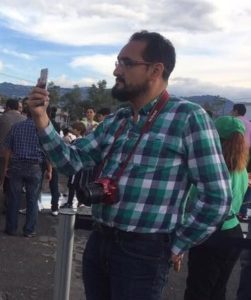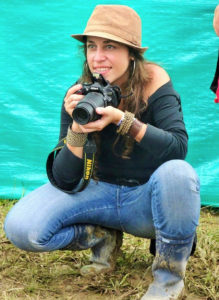There is a recurring myth that says journalists aren’t good with numbers because if they were, they wouldn’t be journalists. However, not knowing how to count is a luxury freelance journalists cannot afford.
This is because the lack of a fixed revenue stream requires more organization, either to deal with periods of less work or to deal with recurring delays in payments for work done. During the times of COVID-19, the situation is even more serious for freelancers, who are affected by the general worsening of the financial situation of the media, as shown by a survey from the Sindicato de Prensa de Buenos Aires (Buenos Aires Press Union).
Across the continent, journalists who dedicate themselves exclusively to working as freelancers shared the common problems they face and the methods of survival they developed in a competitive and undervalued market.

Carlos Tomasini: "Journalistic work is no longer my main income, but it gives me visibility." Photo: courtesy
Mexican freelancer Carlos Tomasini was an editor of the newspaper Reforma before he was fired in 2012 and immediately became a freelance journalist. What started as a necessity became a choice as he managed to better balance his professional and personal life. In the beginning, despite his years of newsroom experience, he faced a completely new challenge, since he knew few publishers and little about the publishing market. In addition to establishing a network of contacts and customers, he had to learn how to deal with the costs and prices of his journalism work.
“During all this time, I learned which outlets pay more and who pays less, how much more or less is a story on the internet, how much a reportage costs for a newspaper. So this is the first thing [that happens] when I go to an outlet or an outlet calls me, I already know more or less how much they will pay,” Tomasini told the LatAm Journalism Review. "The second is, I [already] have a price, and when they ask for a quote on something, what I have to take into account is how much it will take up of my day, how much I would need to earn if I work on it."
Knowing how to quantify how much work it will take to finish an article and to price it are crucial skills to survive as a freelance journalist. These times are increasingly difficult, especially as there is little room for negotiation with outlets.
“The outlets are the ones that put the price. We have little margin for negotiation, each one already has how much they will pay, more or less. Then we explain, ‘but this story will take time, can't you pay a little more?’ Then, they tell me that’s all they can afford, and I give up because it is not worth staying on that assignment for more than a week for R $500 ($100 dollars),” Joana Suarez, Brazilian freelancer, told LJR. “Let's think about freelancer’s financial sustainability because you can't just talk about dreams because journalism is not volunteer work.”
The general practice in the freelance journalism market is to pay for a product, not by the hour. However, the work on an article may require much more time than another one with the same word length. This is not normally taken into account by the contracting outlet.

Ana Peralta has lived in Rio for six years working for Spanish-speaking vehicles. Photo: courtesy
Based in Rio de Janeiro six years ago, Ana Peralta, a Spanish journalist, produces reports on Brazil and Latin America for Spanish-speaking outlets in the continent and also in Spain. When a freelancer has an idea for an approved story for an outlet, usually some of the work is already done. However, that labor may go unpaid if the pitch is rejected.
“The pre-production of the pitch takes up more time, but before offering a pitch that may not work, I want to be sure beforehand that if the outlet says it wants it, I already have an action plan. But then they might no be interested in the pitch, and it happens almost daily,” Peralta told LJR.
Non-journalism gigs to pay the bills
The obstacles faced by freelance journalists lead many of them to look for other sources of income besides journalism. In this diversification process, they produce content for companies, NGOs, and other organizations, which usually pay more in shorter terms and are more frequent. In the case of Tomasini, this is what guarantees most of her work today.
“Journalism work is no longer the main income, it is my window of opportunity. At the end of the day, I’ve been a journalist for many years, and this is my main job, where I have a significant income... Your signature is your product and what I sell to companies is my journalistic experience, and when they call me it’s because of that,” said Tomasini.
Andrea Aldana is specialized in covering armed conflicts and the mafia in Colombia. Expertness in the subject makes it sought by international NGOs to conduct investigations and write reports on violence in the country. Although she considers herself in a more favorable position than other independent journalists in Colombia because she has always had a job, the service for the NGO represents a substantial increase in her account.
“I was hired to investigate Medellín's security. So it's like a big story you do for the NGO and the NGO pays $1,000 (dollars) or $2,000 for a report. This is about $3 million pesos here, while a newspaper is paying $100 or $150 for a story,” Aldana told LJR.

In two years, Joana Suarez published stories in 15 different vehicles. Photo: courtesy
Suarez resists taking up non-journalism related work. She has been working in this field for two and a half years, after leaving the newspaper O Tempo, in Belo Horizonte, and moving to Recife. During this period, she wrote more than 30 reports for 15 different outlets.
“[I haven't yet done] the so-called non-journalism related gigs, which is to write material for NGOs [and other organizations] ... that kind of gig that makes you money quicker. In my case, I only worked for news organizations, but your pitch isn’t always accepted,” said Suarez.
End of story, time to charge
The issue of financial sustainability is a recurring dilemma for journalists who work as freelancers. Lack of work is a constant worry, but that does not mean that problems end when there is work. The end of the story is often the beginning of a new journey, this time in search of payment.
Gabriel Bonis, who is Brazilian, has been working as a freelancer for six years based in Europe, with stints in the United Kingdom, Bosnia, Greece, and Germany. In addition to the constant concern with pitches, sources, reports, and texts, you need to maintain strict control of payments yet to receive from clients.
“The problem is really organizing the schedule of when it will be paid, so what I always do is to plan two months in advance. If I made four articles and I know it is outlet x, I know that I will receive it in 45 days. It's annoying, but it's more or less how it works,” Bonis told LJR.
The experience with late payments is common across the continent. And it is not, as one might imagine, that the delay is due to higher values for certain jobs.
“It’s very difficult charging because at the end of the month you have to pay for school, you have to pay for your apartment’s rent, you have to buy food, and more. And then, you haven’t received [payment] for the work you did four months ago… the issue of getting paid has been the principal problem. There are payments less than $100 (dollars) that take three months to come in,” Tomasini said.
In the case of journalists who are starting out and who are not yet known to editors or do not have a long list of works published, a common practice is to work for free. Let anyone throw the first stone who has never considered this possibility or has been impelled to accept these conditions.

Andrea Aldana is specialized in covering armed conflicts and the mafia in Colombia. Photo: courtesy
“In Colombia, there isn’t a freelancer, no single one who hasn’t started their work in journalism without working for free. To be recognized as a freelancer, you need to work for free. If you are a stranger, but want your name in journalism and want to be paid immediately, it will not happen. You may be a stranger, but you work for free and people will notice you and, later, if they start looking for you,” said Aldana.
‘Business development’
So far we have spoken of two costs that are not always taken into account in the freelancer's labor: the time for pre-calculating pitches and how to charge for work performed that has not yet been paid. A third part still needs to be taken into account: prospecting for potential customers, or ‘business development.’

Bonis keeps strict control of payments yet to receive. Photo: courtesy
“I would say I come up with 60% of the ideas for the stories I write. Freelance life is like that: if you don’t get yourself out there, nobody will be sending you a story idea, so I offer a lot of things,” said Bonis. “The first step is to get the editor's email and then you send it. Then you can get that person to read your email, so I focus on the most specific guidelines. Now how this is going to convert to actually playing is something else.”
Peralta, is also actively seeking customers. Despite living in Brazil for six years, she is aware that she needs to be reminding editors and outlets where she is and that she is available to work. Even holidays are opportunities to look for work. Recently, she was in Ecuador, where she gained access to an Indigenous tribe that has very little contact with outsiders. She is currently trying to negotiate the images with a TV channel.
“The freelancer never says, I'm ready for a vacation. You are thinking about what you are going to do when you return, how you are going to get money if you don't have fixed customers, how you are going to get story ideas for when you get back home,” said Peralta.
Because she is internationally recognized when it comes to organized crime or armed conflicts in Colombia, Aldana recognizes that many jobs are currently reaching out to her. But even though one is highly specialized and qualified to work on a subject, this is no guarantee of work.
“As a freelancer, even if one is known, if I don’t have work, I don’t have a way to provide for myself. It is not a job in which you will ever have financial security, even if your name is known, even if the jobs reach out to you,” said Aldana. "It is very unstable and, the reality is that I will never be able to say how long it will take for me to reach stability because right now if I don’t work, I’ll be out on the street."